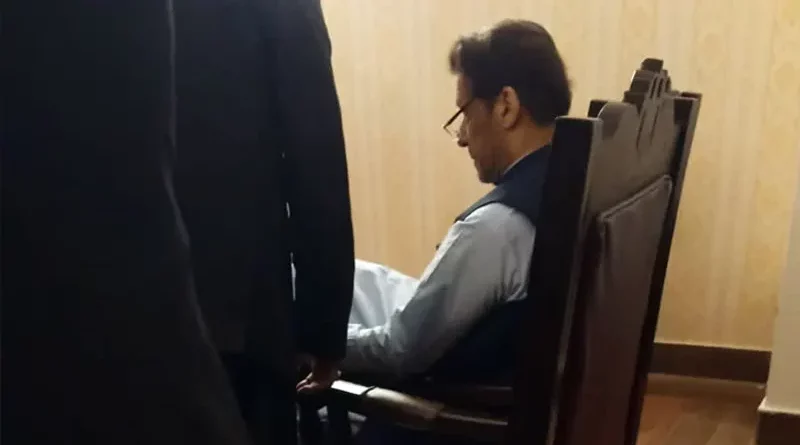NAB gets 8-day physical remand of ex-PM in Al-Qadir Trust case
ISLAMABAD: The legal woes of Pakistan Tehreek-e-Insaf (PTI) Chairman Imran Khan multiplied on Wednesday when an accountability court sent him on an eight-day physical remand to the National Accountability Bureau (NAB) in the Al-Qadir Trust case.
The former prime minister was presented before Judge Mohammad Bashir in the land corruption case at Islamabad Police Lines, which was given the status of a court as a “one-time dispensation” late on Tuesday night.
Judge Bashir, while announcing the verdict reserved earlier, directed officials to present Khan in court on May 17.
Khan was arrested on Tuesday by Rangers — becoming the seventh former prime minister to be arrested in Pakistan — on the orders of the NAB, an autonomous anti-graft agency, in relation to the corruption case. He was then moved to its office in the garrison town of Rawalpindi for questioning.
Later, announcing the reserved verdict on Khan’s arrest, the Islamabad High Court (IHC) said that the arrest was legal; therefore, Khan’s legal team challenged the verdict in the Supreme Court; however, the plea was turned down by the apex court citing various reasons.
The cricketer-turned-politician faces a slew of court cases and was also indicted today in Toshakhana case — which involved allegations that he did not properly disclose earnings from the sale of state gifts from his time in office.
Al-Qadir Trust case hearing
At the outset of the hearing, the NAB sought a 14-day physical remand — the maximum allowed in the law — but the PTI lawyers opposed the request.
Sources told Geo News that Khan’s legal team was earlier denied permission to meet the party chief ahead of the hearing; however, once the hearing began Khan held discussions — during a hearing break — with lawyers Khawaja Haris, Faisal Chaudhry, Ali Gohar, and Ali Bukhari.
Several officials of the anti-graft watchdog including Special Prosecutor Rafay Maqsood, Deputy Prosecutor Muzaffar Abbasi, Prosecutor Sardar Zulqarnain and investigation officer Mian Umar Nadeem were present in the court.
The NAB prosecutor informed the additional sessions judge Mohammad Bashir that Khan was shown warrants at the time of arrest; however, the PTI chief denied the claims saying that he saw the arrest warrants after reaching the NAB office.
Abbasi assured the judge that all necessary documents will be provided to the PTI chief’s lawyers. The judge, taking a break, directed the legal team to hold discussions with Khan as the former complained that the authorities did not allow them to meet their client before the hearing.
When the hearing resumed after the break, Khawaja Haris argued about the legality of Khan’s arrest.
Sharing the details of the case, Abbasi said that the money was seized by the UK’s National Crime Agency and sent it back to the Government of Pakistan.
After the completion of the lawyer Haris’s argument, Khan complained that which record is the anti-graft watch dog seeking that he is not sharing with the officials.
“The NAB is saying they want to compile the records,” Khan said, questioning when did he deny access to any of the records.
The former prime minister added that all transactions were made after the approval of the cabinet. Recalling yesterday’s events, Khan urged the judges to summon his team of doctors, especially Dr Faisal.
After the defence and plaintiffs concluded their arguments, Judge Mohammad Bashir reserved the verdict which was announced after almost two hours.

